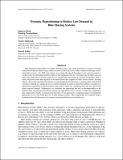Dynamic Repositioning to Reduce Lost Demand in Bike Sharing Systems
Author(s)
Ghosh, Supriyo; Adulyasak, Yossiri; Varakantham, Pradeep; Jaillet, Patrick
DownloadDynamic repositioning.pdf (3.225Mb)
PUBLISHER_POLICY
Publisher Policy
Article is made available in accordance with the publisher's policy and may be subject to US copyright law. Please refer to the publisher's site for terms of use.
Terms of use
Metadata
Show full item recordAbstract
Bike Sharing Systems (BSSs) are widely adopted in major cities of the world due to concerns associated with extensive private vehicle usage, namely, increased carbon emissions, traffic congestion and usage of nonrenewable resources. In a BSS, base stations are strategically placed throughout a city and each station is stocked with a pre-determined number of bikes at the beginning of the day. Customers hire the bikes from one station and return them at another station. Due to unpredictable movements of customers hiring bikes, there is either congestion (more than required) or starvation (fewer than required) of bikes at base stations. Existing data has shown that congestion/starvation is a common phenomenon that leads to a large number of unsatisfied customers resulting in a significant loss in customer demand. In order to tackle this problem, we propose an optimisation formulation to reposition bikes using vehicles while also considering the routes for vehicles and future expected demand. Furthermore, we contribute two approaches that rely on decomposability in the problem (bike repositioning and vehicle routing) and aggregation of base stations to reduce the computation time significantly. Finally, we demonstrate the utility of our approach by comparing against two benchmark approaches on two real-world data sets of bike sharing systems. These approaches are evaluated using a simulation where the movements of customers are generated from real-world data sets.
Date issued
2017-02Department
Massachusetts Institute of Technology. Department of Electrical Engineering and Computer ScienceJournal
Journal of Artificial Intelligence Research
Publisher
Association for the Advancement of Artificial Intelligence
Citation
Ghosh, Supriyo et al. “Dynamic Repositioning to Reduce Lost Demand in Bike Sharing Systems.” Journal of Artificial Intelligence Research (2017): n. pag. mEDRA. © Copyright 2017 AI Access Foundation, Inc.
Version: Final published version